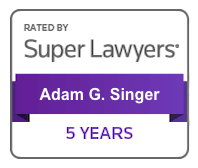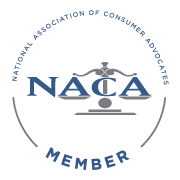Debt Collection Harassment

While creditors are entitled to repayment of loans, they cannot use improper, harassing or deceptive methods in their attempts collect debt, regardless of how much is owed. The Fair Debt Collection Practices Act (FDCPA) protects borrowers from improper collection practices and provides individuals harmed by debt collectors’ illegal actions with robust remedies.
Know Your Rights Under the Law and Turn the Tables on Debt Collectors
Debt collectors must follow strict guidelines set forth by the FDCPA when contacting borrowers.
1. Prohibition against Harassment
The law prohibits debt collectors from harassing, oppressing, or otherwise abusing a debtor or anyone else they contact when attempting to collect a debt. Prohibited actions directed at the debtor include:
- Using or threatening to use physical violence
- Performing or threatening to perform illegal actions to damage debtor’s reputation or property
- Use of obscene or profane language
- Making repeated phone calls to annoy, abuse, or harass anyone answering the phone
- Publishing or threatening to publish the debtor’s name on lists of debtors(This does not include reporting information to a credit reporting agency).
- Advertising to sell the debt in an effort to coerce payment
- Threatening to take action that the creditor does not intend to do, such as a threatening a lawsuit without intending to sue
- Calling debtors without properly disclosing their identity
2. Prohibition against making False, Deceptive or Misleading Statements
In addition to harassment, debt collectors are also forbidden from making any false, deceptive, or misleading statements as they attempt to collect debt or to obtain information about the consumer. Examples of such behavior include:
- Claiming to be a law enforcement agency or otherwise associated with a government agency
- Falsely representing the character or amount of the debt
- Falsely claiming to be an attorney or a credit reporting agency
- Threatening the debtor with arrest or imprisonment, suggesting that failure to pay a debt is a crime.
- Threatening to seize debtor’s property or garnish wages
(unless such action is legal and actually intended) - Threatening to report false information to credit reporting agencies
- Furnishing documents resembling those of a government agency or court
- Using a false business name
- Attempting to collect fees, fines, or interest that are illegal or not part of the agreement with the creditor
- Failing to disclose status as a debt collector.
- Failing to disclose that any information obtained from the debtor will be used for the purpose of debt collection (except if the communication is a formal pleading made in connection with a legal action).
3. Other Communication Restrictions on Debt Collectors
Debt collectors have to follow additional rules when contacting a debtor. Some prohibitions on debt collectors’ actions include:
- Making calls at inconvenient times, especially before 8.a.m. or after 9 p.m.
- Contacting debtor if the collector knows the debtor has retained an attorney
- Contacting debtor’s workplace if employer prohibits such communications
- Contacting, or threatening to contact, third parties such as relatives, neighbors, employers without express permission (except consumer reporting agencies and attorneys)
- Contacting the debtor after the debt collector has been notified in writing to cease communication (unless to inform the debtor that collection efforts are being terminated, or to inform debtor of certain actions that the collector intends to perform to which it is entitled under law)
- When communicating through mail, using a postcard or placing information on the envelope that visibly indicates that the source is a debt collector
*What to Do When Contacted by a Debt Collector:
- Keep a written record of contact
- Request verification that the debt collector and the debt are legitimate
- Verify the amount alleged as owed and the original creditor
- Request the caller stop making harassing calls
- Follow-up all requests in writing sent via certified mail return receipt
Even More Protections for Debtors in New York State
The New York State Department of Financial Services has particular regulations requiring debt collectors to provide additional disclosures to consumers. The regulations are designed to protect consumers beyond the requirements of the FDCPA.
The regulations require debt collectors to provide initial disclosures when they initially contact a debtor. Within 5 days of the initial communication, the debt collector must provide the debtor with “clear and conspicuous written notification” that debt collectors are prohibited from engaging in “abusive, deceptive, and unfair debt collection efforts” under the FDCPA.
Debt collectors must also provide a written notice stating that if a creditor or debt collector receives a money judgment against the debtor in court, state and federal laws may prevent certain types of income from being seized to pay the debt such as Social Security, public assistance, unemployment and disability benefits, pensions, and veterans’ benefits.
In situations where the alleged debt has been “charged off,”(declared unlikely to be collected) debt collectors have to provide debtors with a written notice within 5 days of the initial communication with the debtor stating the following: the name of the original creditor, an itemized accounting of the charged-off debt, any amounts paid on the debt since the charge-off, and the total interest, charges and fees.
New York State regulations also provide debtors with additional protections such as the right to request “substantiation” of any charged-off debt at any time during the collections process.
The regulations also require debt collectors to notify debtors of their right to dispute the debt, and whether the statute of limitations has expired. The regulations also include procedures for documenting any agreement between the consumer and the debt collector to satisfy or otherwise settle the debt.
Debt Collection Practices in New York City
Individuals and businesses operating as debt collectors in New York City are subject to regulation under federal, state, and local law. Any business that wishes to collect debt in New York City must first obtain a license from the NYC Department of Consumer Affairs known as the Debt Collection Agency License.
Additional regulations related to credit or debt collection include:
Fair Credit Reporting Act (NY Gen Bus L § 380 – 380-U)
Credit Services Business (NY Gen Bus L § 458-A – 458-K)
Don’t Delay- Take Action to Enforce Your Rights
If a debt collector contacts you, ignoring or avoiding a call can make matters worse and may result in a default judgment. If you are being harassed by a debt collector, contact the Credit Report Law Group for assistance.
Most consumers obtain credit with the intention of repaying the loan within a reasonable period of time. Due to unforeseen circumstances, however, many borrowers are unable to pay their debts as expected and find themselves the target of lawsuits or other aggressive actions by lenders, credit card companies, and collection agencies. In other cases, issues of mistaken identity lead to consumers being sued for unfamiliar debts for which they have no responsibility.If you are unable to pay your debts or are threatened with debt collection efforts or a lawsuit, a debt defense attorney may be able to stop the collection process or even to have an existing judgment set aside.






